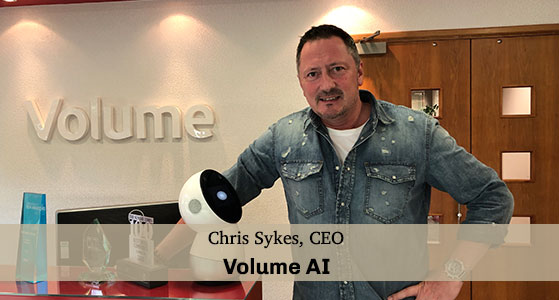30 Most Valuable Companies to Watch 2019
CIO Bulletin

In the business-dominated world of today, brands have high economic value because customers identify an organization, product, or service through their overall experience of a brand. To keep customers coming back, it's essential to have the right customer interaction. Brand engagement remains important in Sales & Marketing because it can explicitly transform the customer experience.
With the vision that technology would surely and rapidly permeate-sales & Marketing operations of the future, Chris Sykes founded Volume 22 years ago. By creating the next level of customer interaction, Volume today is transforming brand engagement by converting content into conversations.
Volume’s vision is “to turn marketing into a ‘pull’ discipline from a ‘push’ discipline and to transition the ‘search’ generation to an‘ask’ generation through the delivery of more immerse customer experiences providing information, support, content, and advice at the point of need via AI-powered conversational interfaces.”
Being a leading developer of conversational AI products, Volume delivers Big Brain Chat bots, humanoid robots, NLP data-model-testing tools, and VR/MR/AR experiences and scenarios. Innovation is at the heart of what Volume does, and customers remain an essential part of Volume.
Some companies have partnered with Volume since its inception: Dell was a strong supporter of Chris’svision, and an early pioneer of the internet. Volume scaled its capabilities to support Dell’s 23 EMEA business units, and was instrumental in helping Dell move from print-to-inventory to print-on-demand through an online portal that housed the company’s digital marketing assets in raw and pre-compiled formats.
Today, Volume still works with Dell, and with leading analyst firms including Gartner and IDC to understand and assess the commercial and competitive industry landscape. Volume’s long-term relationships with its customers (large corporate entities) are testament to the company’s successful delivery model and track record. 50% of Volume’s current revenue comes from Silicon Valley, with minimal in-country support. The majority of Volume’s resources are based in the UK and Sri Lanka. This gives US West Coast customers a time advantage: Volume can have projects delivered and in customers’ in boxes at the start of their working day.
At Volume, customer loyalty is measured through revenue, the size of the customer-contact network, and the length of the customer relationship. Volume’s client attrition is incredibly low for the industry and the company enjoys business continuity even through economic downturns and customer-business restructuring. Volume continually shares the latest and relevant technologies and advancements with its customers with quarterly digital “look books”, which illustrate potential use cases for their businesses. In addition to this, monthly calls and analyst vendor briefings help to assess Volume’s position in the market and differentiate it from competitors.
Culture at the Workplace
As a result of the company’s investment in its culture and working environment, Volume is a Sunday Times Top 100 Business to Work For. Volume’s three offices in the UK and Sri Lanka are designed to provide employees with a motivating, inspiring, professional, and fun place to work, collaborate, and meet with customers. Meeting rooms have been converted to open-plan spaces to promote collaboration and productivity.
Flexible working practices at the firm also allow staggered working hours and homeworking when needed. There are quarterly SWOT reviews on a customer-by-customer basis. The team’s performance is measured byquality of engagement, execution, and customer satisfaction. Every Volume employee has a six-monthly appraisal based on a set of predefined and agreed goals, and professional/personal objectives. These goals are aligned with the successful delivery of the company’s vision and values, customer satisfaction, growth,and profitability.
From an organizational standpoint, Volume has avery well organized Executive Management Team. The EMThas collective responsibility for all operations (IT, Facilities, HR, Supplier Management, Security,etc.) and recently worked on the company’s business-continuity and disaster-recovery plans to reinforce itsalignment on all areas that impact operational excellence.
The Mastermind
Chris Sykes, CEO
Chris established Volume in 1997. In 2000, hefounded Then (UK) Ltd; a developer of MRM software. In 2002, Then (UK) Ltd was recognized by Gartner and appeared in its 2002/03 MRM Magic Quadrant as a niche vendor. Following Then’s acquisition by Aprimo, Chris focused exclusively on spearheading Volume.
As a futurist, Chris took the decision in 2015 to pivot the business toward AI, and looked at how it could beapplied within a sales, marketing, and customer-experience context. Chris coined the term “experiential AI” (EAI) and has since built the three pillars that underpin it: AI-powered conversational platforms, humanoid robotics & VR devices, and augmented reality. Chris is a regular speaker and panelist at AI events and showcases, and was a finalist in the 2018 UK Private Business Awards for CEO of the year.
“We’re customer-experience creators, with experiential AI at our heart, specializing in the three pillars of experiential AI: VR/AR, robots, and Big Brain Chatbots.”
Digital-marketing
Artificial-intelligence
Lifestyle-and-fashion
Food-and-beverage
Travel-and-hospitality